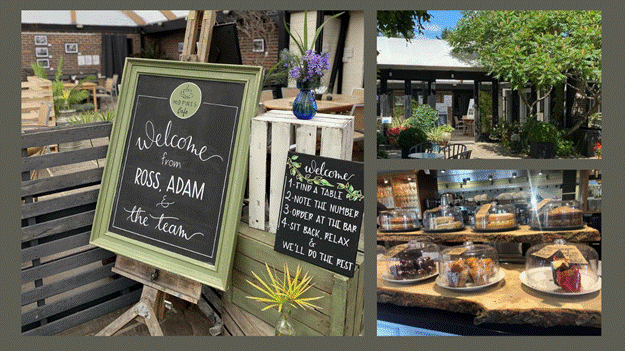Denmans Garden: A Garden with a Story
Bounded by Arundel and Chichester in West Sussex, Denmans Garden spans approximately four acres. Its gentle incline rests sheltered by the South Downs. Once a post-war market garden, it is now an ornamental garden renowned for its loveliness and craftsmanship. Denmans is currently a Grade II Listed garden on England’s National Heritage List. Its transformation—food production and wartime abandonment to contemporary building—is testament to harmony between history, innovation, and sustainability.
Denmans Garden: From Market Garden to Mediterranean-style Paradise
Joyce Robinson’s Vision and “Glorious Disarray”
Joyce Hilda Robinson (Mrs J.H.) and her husband Hugh purchased part of Lord Denman’s old estate in 1946. The site was neglected and broken up by the ravages of World War II. They immediately established a market garden to provide Covent Garden and neighborhood shops. In the 1950s, Joyce turned her attention to ornamental gardening.
Her grand transformation was in the early 1970s. Following a visit to the Greek island of Delos in 1969, she added gravel gardens and two dry “riverbeds” constructed from Sussex stone. She liked her plants grouped informally, a look that she referred to as “glorious disarray.” She later expounded on this philosophy in her 1989 book of the same name.
Two Iconic Features of Denmans Garden: Dry Riverbeds and Gravel Gardens
Mrs J.H.’s gravel gardens were not only pretty—they were revolutionary. They enabled planting to endure drought. The two dry riverbeds are still central features today. Made from entirely local Sussex stone, with one Hampshire-flagstone bridge, they introduced texture and movement into the landscape. Native plants mellowed their edges, combining beauty and function.
John Brookes’ Influence: Structured Elegance and “Room Outside”
A Modern Garden Master Arrives
In 1973, renowned designer John Brookes MBE came to Denmans as part of the National Garden Scheme. Attracted by Mrs J.H.’s easy-going planting, he came back in 1979 to look after and develop the garden. Brookes also made his home and taught design here until 2018. He is most renowned for his devising of the “Room Outside” concept—outside areas planned like inside rooms.
From “Glorious Disarray” to “Controlled Disarray”
Brookes respected Joyce’s casual planting but wished to introduce organization. Thus, he came up with curving walkways, geometric pools, and topiary elements. His design drew inspiration from Modernist painters such as Piet Mondrian and designers such as Thomas Church. The dry riverbeds and gravel beds remained focal points. In addition, Brookes incorporated two pools—a circular and a free-form—and provided balance and diversity to the garden. Consequently, Denmans became serene and dramatic.
Garden Design and Layout: A Walk through Curves and Contrasts
Curves, Paths, and Water Features
Meandering gravel paths and mown grass encourage guests to wander at will. There are no formal paths, which fosters exploration. Interestingly, the two ponds and dry riverbeds provide water-themed points of interest. The circular pond on the grounds in front of the cottage duplicates the building’s style. In contrast, the casual pond below presents a more gentle, organic shape.
Garden “Rooms” with Distinct Characters
Denmans is a set of outdoor “rooms.” The gravel gardens, walled garden, woodland margins, and lawns each contribute a distinct atmosphere. Benches, secluded spots, and sculptures (painted Brookes-blue) punctuate the garden. Thus, the visitor is subjected to continual contrast—sunbeams yield to shadowed spaces, formal edges become natural curves.
Denmans Garden: Plants, Biodiversity, and Year-Round Interest
A Rich Palette of Species
Denmans is blessed with numerous garden droughts. These consist of agaves, palms, pomegranates, herbs, grasses, and perennials. Exotics and native species intermingle. This means that the garden remains colorful even in the absence of rain.
Seasons of Color and Contrast
Each season provides surprises. Spring has delicate blooms, and summer has full growth. Autumn is adorned with burnt-orange and gold leaves. Winter has architectural seedheads and tough plant forms. The garden, therefore, is never boring.
Denmans Garden: Sustainability and Ecological Sensitivity
Drought-Tolerant and Low-Maintenance by Design
The garden design conserves water. Moisture loss and weeds are prevented by gravel mulch. In addition, the majority of the plants are locally adapted, requiring minimal watering and attention.
Local Materials and Peat-Free Practices
Denmans shuns imported stone and peat composts. Sussex flint and reclaimed materials, however, dominate. Timber and other materials are reused or sustainably harvested. Events such as “Room Outside” reuse garden materials, minimizing waste.
Wildlife-Friendly Landscaping
The dense planting and flowers throughout the year of the garden attract insects, birds, and mammals. Water elements offer drinking and bathing sites. Benches and sculptures encourage visitors to linger and appreciate nature.
Visitor Experience about Denmans Garden: What You’ll Discover

Denmans Garden Free-Roaming Exploration
Denmans welcomes unplanned wandering. Visitors can stroll at leisure, stop near ponds, or relax on benches. Every path reveals fresh plantings or quiet corners.
Facilities: Café, Nursery, and Community
Midpines Café, at the old dairy, provides light refreshments and beverages. An olive tree-covered terrace has outside seating. The nursery retails quirky, peat-free plants produced at Denmans. The gift shop sells garden-related items in the meantime. Helpful volunteers gladly offer advice and anecdotes.
Events, Workshops, and Tours
Seasonal activities add richness to every visit. From springtime bulb shows to fall pruning classes, something new is always happening. Tours, plant festivals, and design shows educate visitors further. Thus, repeat visitors frequently find new pleasures.
Recognition, Awards, and Legacy
Official Designations and Accolades
In 2020, Denmans became a Grade II Listed garden. This confirmed its importance in post-war garden history. Furthermore, it has won awards like RHS Partner Garden of the Year and Gold in South & South East in Bloom.
Brookes’ Lasting Influence
John Brookes’ teachings spread worldwide. His “Room Outside” idea inspires modern designers. Denmans served as his workshop and classroom for 37 years. As a result, the garden reflects his philosophy: practical, beautiful, and human-centered design.
Conclusion: Denmans Garden A Garden That Grows with You
Denmans Garden demonstrates how design can reconcile beauty and function. From market garden to tranquil oasis, it manifests two compelling visions. Joyce Robinson’s untamed imagination converges with John Brookes’ refined order. Both created a space that is timeless in its essence.
Visitors experience not merely plants but ideas, tranquility, and inspiration. Thus, whether gardener or merely looking for peacefulness, Denmans has a “room outside” for you.


